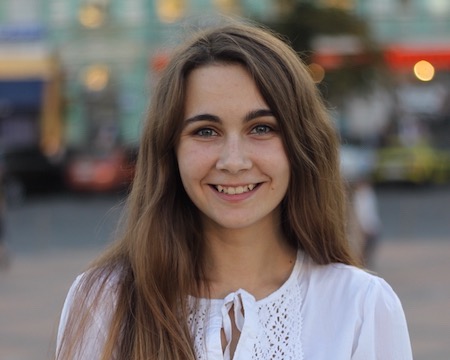“You should see their faces”: Advising Ukrainian students at the University of Bern

Tetyana Fedorchuk prefers to be called Tania. She works as an intern at UniBE International. Her job is to advise students who fled to Switzerland and are interested in continuing their studies at the University of Bern. As Ukrainian, she can greet the newcomers in their mother tongue. In this role, she is confronted with many personal, cultural and administrative challenges.
Almost every day, a student from Ukraine comes through the door of the offices of UniBE International and asks how they can continue their studies in Bern. Often, they come with their parents, or sometimes with their Swiss host families. “To Ukrainians face to face communication is very important because it creates a sense of trust,” explains Tania. When she replies in Ukrainian, she immediately senses their relief and joy – “you should see their faces,” she says.
Explaining cultural and educational differences
People who arrive here from Ukraine have escaped traumatic circumstances. Speaking to someone who can explain to them in their mother tongue how to continue their studies is hugely important to them. It is also helpful for their parents, who sometimes accompany them and struggle with English or German. Tania advises them on their options at the University of Bern and points out the differences between the Swiss and the Ukrainian education systems.
Tania explains: “in Ukraine, parents do everything they can to get their children into universities – it is their passport to a successful future. I read an estimate that approximately 79% of school leavers enter university. To do so they have to pass an independently conducted exam for which students prepare for about a year. There is a lot of social pressure on finishing university education as early as possible. Once students attend university, they stay in subsidised dormitories, many receive a scholarship and most of them do not have to pay tuition fees.”
To those students who by fate or choice have arrived in Bern, she has to point out that the Swiss education system is different from the one they know: “Unlike in Switzerland, students in Ukraine have a strict curriculum, which means they cannot choose their classes, and the hierarchy between lecturers and students is very important. Students would not normally approach their lecturers to ask questions or seek help.” Getting used to the Swiss educational culture is a challenge for many students from Ukraine.
Tania is aware that she cannot solve all of these issues, but at least she can help students to make informed decisions. She tries to find out for each student whether studying at the University of Bern fits their educational profile. Not everybody she advises decides to study at the University of Bern in the end. She does her best to lay all the information on the table, but she also feels that “it is important for them not to feel trapped in just one choice.”
Tania’s path to Bern
After studying Latin and ancient Greek philology, Tania completed a Master in English translation. During her studies, she always wanted to go on an Erasmus exchange abroad. Tania explains how in Ukraine each Erasmus spot is coveted by about 50 applicants: “there is a lengthy process with stressful interviews and intense competition.” After several attempts, she succeeded in securing a place to study in Bratislava, Slovakia.
During her time in Slovakia, Tania discovered that she was fascinated by networks of migration. She volunteered for the European Solidarity Corps, promoting education exchanges at schools. Then she went to the University of Padua, Italy, where she is currently studying for a Master in mobility studies. She also could not resist going on another Erasmus exchange semester. This time she went to the Freie Universität in Berlin, Germany, to study at the Department of Eastern European Studies.
Tania’s internship at the University of Bern is part of her master’s degree at the University of Padua. She was in Bern when she learned that her home country had been invaded. “When the war broke out, I immediately wanted to go back to Ukraine to help people,” she remembers. Her mother and sister stayed in Ukraine to offer relief to those who have been internally displaced by the war, such as people fleeing Bucha. In the end, going back proved too difficult and too risky. Instead, she saw the website of the University of Bern about the war in Ukraine and offered to help.
At UniBE International Tania’s knowledge of mobility networks and her language skills made her the ideal new team member to help in the current crisis. The war is of course affecting her mentally. “I have good and bad days”, she reflects. “But I can cope with issues by helping others” she adds. After the war is over, Tania wants to work either in academia or perhaps for an NGO. She would also very much like to pursue a PhD in the field of migration policies.
During her time working at the University of Bern, Tania is trying to learn as much as she can about Switzerland. She hopes that people here also approach the Ukrainian visitors with openness. Ukrainians who come to Switzerland could share something of their culture with their hosts, such as Ukrainian traditions, music, poetry, dance, or food. When the war is over, many international friendships and helping hands will be needed to rebuild what has been broken.
Interview: Caspar Bienek
Image: Tetyana Fedorchuk